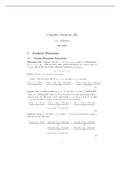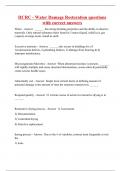Complex Analysis 324
C.L. JUSTUS
July 2021
1 Analytic Functions
1.1 Cauchy-Riemann Equations
Theorem p.64 Suppose that f (z) = u(x, y) + iv(x, y) and f is differentiable
at z0 = x0 + iy0 . Then the first order partial derivatives of u and v exist at
(x0 , y0 ) and satisfy the Cauchy-Riemann equations at (x0 , y0 ):
ux = vy , uy = −vx
Further, f 0 (z0 ) = ux (x0 , y0 ) + ivx (x0 , y0 ).
Proof – We first note that if z0 = x0 + iy0 and z = x + iy, then
f (z0 + z) − f (z0 ) u(x0 + x, y0 + y) − u(x0 , y0 ) v(x0 + x, y0 + y) − v(x0 , y0 )
= +i·
z x + iy x + iy
(1)
Suppose that f is differentiable at z0 , i.e. f 0 (z0 ) exists, i.e. limz→0 f (z0 +z)−f
z
(z0 )
exists, i.e. f (z0 +z)−f
z
(z0 )
tends to f 0 (z0 ) irrespective of the path along which z
tends to zero. By Theorem 1 p.47, and letting x → 0 and y = 0 in (1), so that
z → 0, we see that ux and vx both exist at (x0 , y0 ) and that
f (z0 + z) − f (z0 ) u(x0 + x, y0 ) − u(x0 , y0 ) v(x0 + x, y0 ) − v(x0 , y0 )
= +i·
z x x
→ ux (x0 , y0 ) + ivx (x0 , y0 )
(2)
Similarly, letting y → 0 and x = 0, so that z → 0, we see that both uy and vy
exist at (x0 , y0 ) and that
f (z0 + z) − f (z0 ) u(x0 , y0 + y) − u(x0 , y0 ) v(x0 , y0 + y) − v(x0 , y0 )
= +i·
z iy iy
v(x0 , y0 + y) − v(x0 , y0 ) u(x0 , y0 + y) − u(x0 , y0 )
= −i·
y y
→ vy (x0 , y0 ) − iuy (x0 , y0 )
(3)
1
,From (2) and (3), it now follows that
f 0 (z0 ) = ux (x0 , y0 ) + ivx (x0 , y0 ) = vy (x0 , y0 ) − iuy (x0 , y0 )
and from the latter, that
ux (x0 , y0 ) = vy (x0 , y0 ), uy (x0 , y0 ) = −vx (x0 , y0 )
Q.E.D.
Theorem p.66 Let f (z) = u(x, y) + iv(x, y) be defined in a neighbourhood
of z0 = x0 + iy0 , and suppose that (1) ux , uy , vx , and vy exist everywhere in the
neighbourhood of z0 , (2) ux , uy , vx , and vy are all continuous at (x0 , y0 ), and
(3) ux , uy , vx , and vy satisfy the Cauchy-Riemann equations ux = vy , uy = −vx
at (x0 , y0 ), then f 0 (z0 ) exists and f 0 (z0 ) = ux (x0 , y0 ) + ivx (x0 , y0 ).
Example 1 Investigate the differentiability of f (z) = ez .
Solution – Since eiy = cos y + i sin y, it follows that ez = ex (cos y + i sin y) =
e cos y + i(ex sin y) = u(x, y) + iv(x, y) where u(x, y) = ex cos y and v(x, y) =
x
ex sin y. Clearly, ux , uy , vx and vy all exist and are continuous at all points (x, y).
Now we are only left to check whether the third condition in Theorem 2 holds
- we have that ux = ex cos y, uy = −ex sin y, vx = ex sin y and vy = ex cos y, so
that ux = vy and uy = −vx . Therefore, it follows from Theorem 2(p.66) that
f 0 (z) exists and, in particular, f 0 (z) = ex cos y + i(ex sin y) = ez .
Example 2 Investigate the differentiability of f (z) = |z|2 .
Solution – We first note that f (z) = |z|2 = x2 + y 2 = u(x, y) + iv(x, y) where
u(x, y) = x2 + y 2 and v(x, y) = 0. Clearly, ux , uy , vx and vy all exist and are
continuous at all points (x, y). Furthermore, ux = 2x, uy = 2y, vx = vy = 0, so
that ux = vy and uy = −vx only if x = 0 and y = 0. By Theorem 2 (p.66), f has
derivative only at the point (0, 0), and in particular, f 0 (0) = ux (0, 0)+ivx (0, 0) =
0 + i0 = 0.
Example 3 Investigate the differentiability of f (z) = x3 + i(1 − y)3 .
Solution – Since u(x, y) = x3 and v(x, y) = (1 − y)3 , we can clearly see that
ux , uy , vx and vy all exist and are continuous at all points (x, y). Furthermore,
ux = 3x2 , uy = 0, vx = 0 and vy = −3(1 − y)2 , so that uy = −vx for all
points (x, y) (since 0 = 0) and ux = vy only if 3x2 = −3(1 − y)2 only if
x2 + (1 − y)2 = 0 only if x = 0 and y = 1. Therefore, the function f has
derivative only at the point (0, 1). It follows from Theorem 2 (p.66) that f
is differentiable nowhere in C except at z = 0 + i(1) = i, and in particular,
f 0 (z) = ux (0, 1) + ivx (0, 1) = 0 + i.0 = 0.
2
,Theorem p. 69 Suppose the function f (z) = u(r, θ) + iv(r, θ) is defined in an
�-neighbourhood of a non-zero point z0 = r0 eiθ0 , and suppose that (1) ur , uθ , vr ,
and vθ exist everywhere in the neighbourhood of z0 , (2) ur , uθ , vr , and vθ are
all continuous at (r0 , θ0 ), and (3) ur , uθ , vr , and vθ satisfy the polar form of the
Cauchy-Riemann equations rur = vθ , uθ = −rvr at (r0 , θ0 ), then f 0 (z0 ) exists
and f 0 (z0 ) = e−iθ0 [ur (r0 , θ0 ) + ivr (r0 , θ0 )].
1
Example 4 Investigate the differentiability of f (z) = z2 by using Theorem
p.69.
Solution – First we note that if z = reiθ 6= 0, then r > 0 (r 6= 0). Further,
we have that f (z) = z12 = (re1iθ )2 = r12 ei(−2θ) = r12 (cos (−2θ) + i sin (−2θ)) =
1
r 2 (cos (2θ) + i(− sin (2θ)) so that, if f (z) = u(r, θ) + iv(r, θ), we would have
that u(r, θ) = r12 cos (2θ) and v(r, θ) = −1 r 2 sin (2θ). Clearly, ur , uθ , vr , and vθ
all exist and are continuous at each point (r, θ). Further, ur = −2 r 3 cos 2θ, uθ =
−2 2 2
r 2 sin 2θ, v r = r 3 sin 2θ, and v θ = r 2 cos 2θ. It follows that all partial deriva-
tives satisfy the polar form of the Cauchy-Riemann equations at all points
z ∈ C \ {0}. Hence, by Theorem 3 (p.69), f is differentiable at every point
in C \ {0}, and in particular, f 0 (z) = e−iθ ( −2 2 −2
r 3 cos 2θ + i( r 3 sin 2θ)) = z 3 .
Example 5 Is the converse of Theorem p.64 true? If so, explain why. If not,
give a counterexample.
Solution – [We have to check if the following is true - If the first order partial
derivatives ux , uy , vx and vy exist and satisfy the Cauchy–Riemann equations
at a point z0 = (x0 , y0 ), does it follow that the derivative of f at z0 exists? That
is, does f 0 (z0 ) = limu→0 f (z+u)−f
u
(z)
exist?] Suppose that
� z̄2
if z 6= 0
f (z) = z
0 if z = 0
Let’s start by investigating whether the Cauchy–Riemann equations are satisfied
at the point (0, 0). In order to do so, we need to write f in the form u + iv: if
z = x + iy, then
( 3
x −3xy 2
x2 +y 2 if (x, y) 6= (0, 0)
u(x, y) =
0 if (x, y) = (0, 0)
and
(
y 3 −3x2 y
x2 +y 2 if (x, y) 6= (0, 0)
v(x, y) =
0 if (x, y) = (0, 0)
3
, To see whether the Cauchy–Riemann equations hold at (0, 0), we need to find
ux , uy , vx and vy at (0, 0). But, since the definitions of both u and v at non–zero
points do not apply at (0, 0), we must use the definition of a partial derivative
to find the first order partial derivatives at the point (0, 0):
3
h
u(h + 0, 0) − u(0, 0) 2
ux (0, 0) = lim = lim h = lim 1 = 1
h→0 h h→0 h h→0
and 3
h
v(0, h + 0) − v(0, 0) 2
vy (0, 0) = lim = lim h = lim 1 = 1
h→0 h h→0 h h→0
so that ux and vy both exist at (0, 0), and ux (0, 0) = 1 = vy (0, 0). Similarly,
uy and vx exist at (0, 0) and uy (0, 0) = −vx (0, 0) so that the Cauchy–Riemann
equations are satisfied at (0, 0). The questions remains – does f 0 (0) exist? That
is, does limu→0 f (u+0)−f
u
(0)
= limu→0 f (u)
u exist? If u = x + iy, (u 6= 0) then
f (u) ū2 (x − iy)2
= 2 =
u u (x + iy)2
So we have that
1 if x = 0 (u 6= 0)
f (u)
= 1 if y = 0 (u 6= 0)
u
−1 if x = y (u 6= 0)
So f (u)
u tends to 1 as u tends to 0 along the x or y axis, and tends to −1 as u tends
to 0 along the line x = y. Therefore, limu→0 f (u) u = limu→0 f (u+0)−f
u
(0)
does
0
not exist, i.e. f (0) does not exist. Therefore we conclude by counterexample
that the converse of Theorem p.64 does not hold. That is, the first order partial
derivatives may exist and satisfy the Cauchy–Riemann equations at a point
z0 = x0 + iy0 , but that does not necessarily mean that f 0 (z0 ) exists.
1.2 Analytic Functions
Definition A complex valued function f is analytic on an open set S if f is
differentiable at each point in S, and f is analytic at a point z0 if f is analytic
on some neighbourhood of z0 . A function f is entire if f is analytic on C.
Example 1 Investigate the analyticity of f (z) = z1 using the definition of the
derivative. Solution – In order to see whether f is analytic on some open set,
we first have to figure out on which set of values f is differentiable. By using
the definition of differentiability, we see that if z 6= 0, then
1 1
f (z + u) − f (z) z+u − z −1 1
f 0 (z) = lim = lim = lim =− 2
u→0 u u→0 u z→0 z(z + u) z
That is, the derivative of f exists at each point in C \ {0}. Hence f is analytic
on C \ {0}.
4













